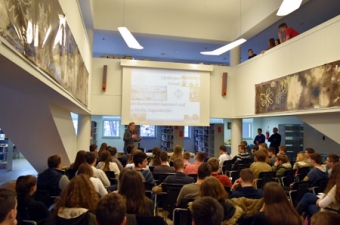Representatives of Youth Initiative for Human Rights (YIHR) in Croatia today visited high schools in Požega, Dubrovnik and Osijek where they held presentations for around 155 students about the work and achievements of the Tribunal. These visits were part of a series of presentations about the ICTY in Croatian high schools which are implemented by YIHR in cooperation with the ICTY’s Outreach Programme.
YIHR representatives informed the students about the reasons why the Tribunal was established, principles it is working on, and they provided an overview of its mandate, structure and most important achievements of the court. The students also learned more about the importance of development of jurisprudence in the context of its contribution to international justice. Special attention was paid to cases which deal specifically with Croatia, namely the trials of Babić, Martić, Jokić, Strugar, Gotovina et al., Blaškić and Norac.
The students asked numerous questions, and one student from Dubrovnik wanted to know why there were never any indictments issued for genocide in Croatia. The presenters explained the definition of genocide, crimes against humanity and war crimes and noted the complexity of proving genocide. High school students in Dubrovnik were also given an overview of the concept of the joint criminal enterprise on the example of the Martić case.
Reactions of the students and teachers who took part in the presentations once again confirmed the importance of the Youth Outreach Project of the Tribunal’s Outreach programme which is aimed at young people in the region. School principal of the Požega grammar school addressed the students before the presentation stressing the importance of raising awareness about the significance of holding trials for war crimes cases. "It was excellent, thought provoking and we should learn from the mistakes of previous generations", commented one of the students from Osijek.
In their feedback provided in evaluation questionnaires, large majority of the students was of the opinion that a crime is always a crime, regardless of who the perpetrators are.


